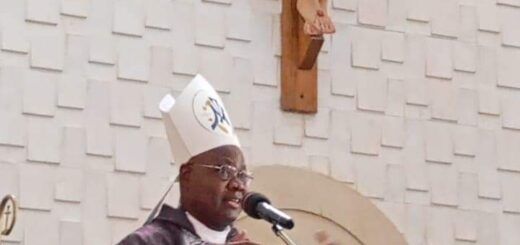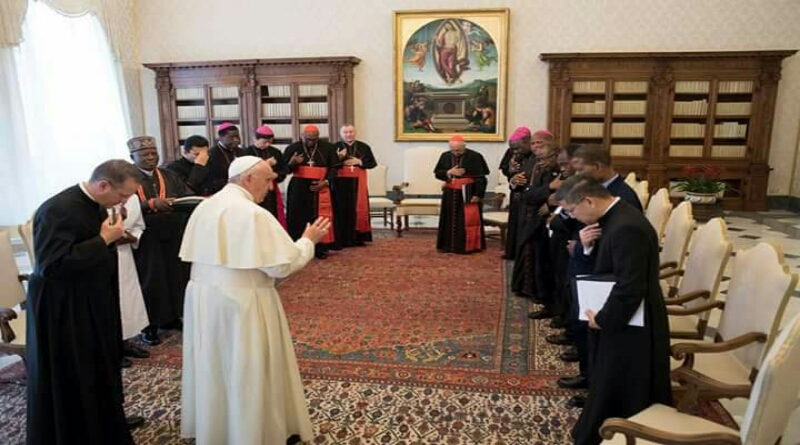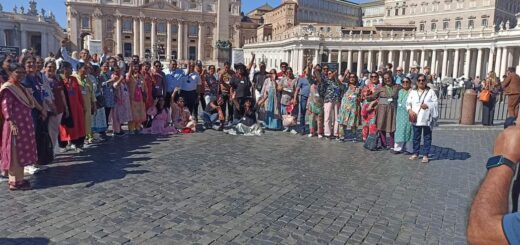TRANSITING FROM A RECEIVING TO A GIVING CHURCH. KEYNOTE ADDRESS BY MOST REV. IGNATIUS A. KAIGAMA, ARCHBISHOP OF ABUJA
by ARCH BISHOP · December 8, 2023
CATHOLIC LAITY COUNCIL OF NIGERIA (CLCN) NATIONAL CONFERENCE (50TH ANNIVERSARY CELEBRATION), 7TH TO 10TH DECEMBER, 2023, AT THE PUBLIC SERVICE INSTITUTE OF NIGERIA, ABUJA. KEYNOTE ADDRESS BY MOST REV. IGNATIUS A. KAIGAMA, ARCHBISHOP OF ABUJA
INTRODUCTION
It is my singular honour and privilege to welcome you, members of the Catholic Laity Council of Nigeria to the Archdiocese of Abuja, and to wish you very fruitful deliberations. Because of the vibrant lay activities all complementing the ministry of the clergy and religious, in the past 50 years, the Church in Nigeria has made phenomenal progress. Only some decades ago, our missionaries came from abroad. We depended largely on foreign help to foster evangelization. Today is a different story. Look at the vibrant Catholic Women Organization (CWO), the dynamic Catholic Youth Organization (CYO) and the fast-growing Catholic Men Organization (CMO), including the flourishing children ministry, all contributing to the monumental growth and progress of our local church.
TRANSITING FROM A RECEIVING TO A GIVING CHURCH
By God’s grace, our many seminaries are full. Every year bishops must choose very carefully from large numbers of those applying for the priesthood to ensure quality. Our religious men and women are not only working in Nigeria but also in Italy, Germany, USA, Canada, Australia, Austria, etc., where even on the streets one can see our female religious well dressed in their habits. The Missionaries of St. Paul, an initiative of the Catholic Bishops Conference of Nigeria are in so many countries of the world. We have come of age and so we can do a little more to shift from gear one of faith to the second, third and even fourth gear. We are no longer infant Christians. We have grown sufficiently to even be the light of Christ to many others elsewhere experiencing a sharp declining faith practice and where churches are being closed or sold. This is our time to give, and our laity cannot be indifferent or remain mere onlookers. They are called to be involved more deeply and not to leave the church as if it is the property of priests and bishops. It is our Church, your Church. To the glory of God, we had such great names as Mr. Raymond A. Njoku, Prof. Gabriel Ojo, Sir David Dodo, Patrick Dokotri, etc., who laid very solid foundations for the Laity Council in Nigeria, and today, fifty years since its inauguration, we have people like Hon. Sir Henry Yunkwap and his executive piloting the affairs of the National Laity Council in Nigeria with great dexterity. I congratulate you the laity for maintaining a very visible and dynamic presence in the church at outstation, parish, deanery, parish, and national levels in the past 50 years.
VOCATION AND OBLIGATIONS OF THE LAITY:
The Second Vatican Council underscores that the vocation of the laity is not realized by obtaining a share of the vocation of the clergy, but by advancing Christ’s mission in the world. Not by being “Father’s little helper” (or the bishop’s little helper) but by fulfilling their tasks in the temporal order and responding to the call to holiness.
On the obligations and rights of the laity, Can. 225 §1 affirms that, lay persons are designated by God for the apostolate through baptism and confirmation, and possess the right as individuals, or joined in associations, to work so that the divine message of salvation is made known and accepted by all persons everywhere in the world. I remember with respect and appreciation Mr. Lucas Dantau, a lay catechist who taught me the basic things of our Catholic faith and those teachers who combined the teaching of secular subjects with the teaching of religion in their classrooms.
Lay people, according to Lumen Gentium are given the special vocation “to make the Church present and fruitful in those places and circumstances where it is only through them that she can become the salt of the earth.” (#33).
Christifideles Laici, a post synodal apostolic exhortation of 1988 calls attention to the duty of lay Christians to make their daily conduct a shining and convincing testimony to the gospel (CL 34, 51); to be present in areas of education, scientific and technological research, artistic creativity and ordering all these towards God.
THE LAITY AND THE FAMILY AS A DOMESTIC CHURCH
As a laity, your families are where your duty to society begins through the bearing and raising of children. The family is the basic cell of society — if the family fails, so does society. Therefore, we must be primarily concerned for the family and protect it at all costs! This is especially true today, where the militant feminist and LGBT agendas spread ideas that are contrary to the message of the Gospel and what the Church teaches about sexuality, marriage, and the complementary roles of man and woman. You must also raise your children with the proper values and prepare them to enter a confusing and hostile world.
The formation of the laity should be at the top of the to-do list of our Church. The lay faithful need to grow in knowledge of the Catholic faith and the principles of morality. The magisterium has insisted strongly on the necessity for catechesis in all its variety, starting with small children being taught the basics of Catholic prayer and worship from their parents and continuing through primary and tertiary education to deepen and reinforce that initial introduction to Christ and His Church. Every Catholic literate adult should own a bible, a catechism of the Catholic Church, a code of canon law, Vatican II document, a prayer book, etc. If the parents seek sound spiritual formation for themselves and attend well to the spiritual formation of their children, those children will be able by their knowledge, their example and their friendship to evangelize the world around them and contribute in their own families to the growth of the Church.
Sponsors at baptism, marriage and confirmation must do more than just being nominal sponsors. They are to accompany those they sponsor to the end. They must be prayerful and exemplary. I commend the courage of the Nigerian nurse who was reportedly fired and deported from the United Kingdom (UK) after being reported for praying for a dying patient, which is deemed unacceptable in the UK health system.
“SYNODALITY” AND THE LAITY
Pope Francis has made “synodality” a hallmark of his papacy. The word “synod” means literally, “walking together”. Up to now, synods had always been held every few years at the Vatican and were strictly defined as a Synod of Bishops — if lay people were invited to watch, they had no real say, much less a vote. Pope Francis has changed that dynamic, asking that discernment must be done together, and decisions must be made together, not explained from the top down. By promoting synodality, Pope Francis is challenging the type of clericalism that leaves the running of the Church in the hand of the hierarchy.
WHAT IS THE CHURCH DOING MENTALITY?
This is often heard on the lips of many lay people. This statement gives the impression that the church belongs to others. Someone asked me recently what the church is doing about the case of Rhoda Jatau, being detained and being tried because of a WhatsApp message she sent about Deborah Samuel Yakubu, killed by some Muslim students in Sokoto because of an alleged blasphemy. It is your duty to voice out against what is evil and corrupt and not to leave all to the bishops and priests. There was the first Fulani catechist in Yola Diocese in the 1940s whose children were baptized and went to Catholic schools. They remained Catholics but no one, not even their sponsors could accompany them one-on-one, and they all left to embrace Islam!
BE LAY MISSIONARIES!
Because of the mandate given by Jesus in Matthew 28, every baptized person is obliged to preach, teach, and propagate the good news by words and deeds; participating either by going to mission, giving for mission, or praying for mission. The Church is therefore not the laity, or the clergy, or the bishops, or the Vatican, or the many institutions built to support its mission. The Church is all those people in communion, working together, each in his/her proper place and order. The concern of the laity shouldn’t be about who-gets-to-do-what within the Church, getting to wear an alb as a lector or extraordinary minister of the Eucharist or wearing fanciful uniforms. Struggles about who-gets-to-do-what have a way of reducing ecclesiology to a function of power. Empowering the laity doesn’t mean aping the clergy. Lay people are called to become more involved in the internal affairs of the Church, and not to remain the “sleeping giants.”
FIGHTING ETHNIC DIVISION AND CORRUPTION IN NIGERIA
A mature and committed laity must fight these two vices that could destroy us as a nation or destroy the one, holy, catholic, and apostolic Church in Nigeria. Lay Catholics must also be more attentive to financial abuse in the Church; this does not only happen in government where bribery and corruption have become a culture. Sexual abuse isn’t the only scandal confronting the Catholic Church.
CO-RESPONSIBILITY
Co-responsibility demands a change in mindset especially concerning the role of lay people in the Church. They should not be regarded as mere “collaborators” of the clergy, but, rather, as people who are really “co-responsible” for the Church’s being and acting.
In Living the Call, philosopher Michael Novak and businessman/philanthropist Bill Simon challenged their fellow Catholic lay men and women that the laity have many important roles to fill including roles that will free priests and bishops from being overwhelmed by administrative tasks, to the point where their primary roles as teachers and sanctifiers become minimized.
CLERICALISM
A well-formed laity will end the tendency of clericalism, which is an exaggerated respect or deference to the clergy. Meanwhile, the most pernicious and widespread form of clericalism in the Church today is the belief that the measure of a layperson is his/her proximity to clerical power or lay persons worrying themselves about who gets to be in the sanctuary during Mass or taking front seats in the church or serving as head of this or that church committee.
CIVIC RESPONSIBILITY
Lay Catholics have a baptismal responsibility to meet their civic obligations as private citizens or as public officials. The late First President of Tanzania, Mwalimu Julius Nyerere proved that politics, with all its negative connotations, can co-exist with justice and holiness. He was a Christian humanist and socialist. It is, therefore, no surprise that Nyerere is on his way to becoming a Saint as the Cause for his Beatification and Canonization is in progress. Nyerere studied Papal Encyclicals and read the work of Catholic philosophers and established a branch of Catholic Action at the university where he studied. Despite his personal religious commitments, he promoted freedom of religion and the right for individuals to change their religious belief.
One must ask the question why in Nigeria we end up with so many court cases after our elections even in those places where over 90% are Christians. And why our politics is still considered a dirty game despite the participation of many Christians.
Lay persons in position of authority should strive for excellence in his/her work to contribute to the pursuit of the common good. They should be prepared to answer whoever calls them to account for the faith that is in them (cf. 1 Pt. 3:15). Unfortunately, many lay people are timid, indifferent, or ignorant about their faith even though it is their duty to carry out their mission in the ordinary surroundings of the world.
CONCLUSION
If the lay vocation is lived fully and well – with all the lay faithful taking seriously the gift and responsibility of their baptism, I am convinced that our Church would be strengthened and renewed in her mission. If every lay man or woman were to behave like Andrew who after encountering Christ found his brother Simon and led him to Jesus (cf. Jn. 1:41-42), or like Mary Magdalene who announced the news of the resurrection of Jesus to Simon Peter and the other disciple (cf. Jn. 20: 1-2), the good news would reach the many who are yet to be reached.
Thank you, my dear lay people of Nigeria, for all you do for the Nigerian Church and beyond. Let us all continue the journey of faith towards a more self-reliant and holier Church which should always be a beacon of hope, in the midst of poverty, hunger, insecurity, religious fanaticism and persecution. God bless you, your families, your endeavours and reward you in abundant measures even in the life to come.




